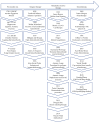Shifting Paradigms in Hemorrhoid Management: The Emergence and Impact of Cap-Assisted Endoscopic Sclerotherapy
- PMID: 39685741
- PMCID: PMC11641974
- DOI: 10.3390/jcm13237284
Shifting Paradigms in Hemorrhoid Management: The Emergence and Impact of Cap-Assisted Endoscopic Sclerotherapy
Abstract
Hemorrhoidal disease (HD) is a prevalent proctological condition that has puzzled people since ancient times, and the most common symptom is painless bleeding. Traditional treatments include conservative treatment, nonsurgical office-based treatments, and surgery. Sclerotherapy is one of the oldest forms of nonoperative intervention and is widely used to treat internal hemorrhoids with the development of endoscopy technology. However, sclerotherapy is always accompanied by complications such as bleeding, pain, abscess, etc., when the sclerosant is injected into the wrong site. Cap-assisted endoscopic sclerotherapy (CAES), a new minimally invasive technology, was first time coined in 2015 for the treatment of hemorrhoidal disease. The left-posterior-right-anterior (LPRA) anus positioning method under endoscopy provides reliable methodological support for advancing hemorrhoidal treatment via endoscopy. The current trend is that treatment for HD has shifted from being performed predominantly by the Department of Proctology Surgery to being managed mostly by the Department of Gastroenterology. This review reviewed the shifting paradigms of sclerotherapy for HD and discussed the emerging development of CAES.
Keywords: anus positioning; cap-assisted endoscopic sclerotherapy; hemorrhoidal disease; hemorrhoids; injection sclerotherapy; rubber band ligation.
Conflict of interest statement
The authors declare no conflicts of interest.
Figures


References
-
- Gallo G., Martellucci J., Sturiale A., Clerico G., Milito G., Marino F., Cocorullo G., Giordano P., Mistrangelo M., Trompetto M. Consensus Statement of the Italian Society of Colorectal Surgery (SICCR): Management and Treatment of Hemorrhoidal Disease. Tech. Coloproctology. 2020;24:145. doi: 10.1007/s10151-020-02149-1. - DOI - PMC - PubMed
Publication types
Grants and funding
LinkOut - more resources
Full Text Sources
Miscellaneous

